| Abiding in Christ |
Nuggets and Gems from the Bible |
Life-study of John |
Witness Lee |
| Always to Pray and Not Lose Heart |
Nuggets and Gems from the Bible |
Life-study of Luke |
Witness Lee |
| Apostle’s Concern for the Believers, The |
Nuggets and Gems from the Bible |
Life-study of Philippians |
Witness Lee |
| Ascended Christ—the Head of the Church and the High Priest in the Heavens, The |
Nuggets and Gems from the Bible |
Life-study of Luke |
Witness Lee |
| Assurance, Security, and Joy of Salvation, The |
Essential Classic Booklets |
-- |
Witness Lee |
| Awaiting Christ for the Transfiguration of Our Body |
Nuggets and Gems from the Bible |
Life-study of Philippians |
Witness Lee |
| Baptism and Anointing of the Man-Savior, The |
Nuggets and Gems from the Bible |
Life-study of Luke |
Witness Lee |
| Bearing Fruit by the Overflow of the Inner Life |
Nuggets and Gems from the Bible |
Life-study of John |
Witness Lee |
| Being Brought into the Lord’s Resurrection and Ascension to Proclaim the Jubilee |
Nuggets and Gems from the Bible |
Life-study of Luke |
Witness Lee |
| Being Like-souled and Risking Our Soul |
Nuggets and Gems from the Bible |
Life-study of Philippians |
Witness Lee |
| Believers’ Fellowship in the Apostle’s Need, The |
Nuggets and Gems from the Bible |
Life-study of Philippians |
Witness Lee |
| Believers’ Support to the Apostle, The |
Nuggets and Gems from the Bible |
Life-study of Philippians |
Witness Lee |
| Best Choice of Paul, The |
Nuggets and Gems from the Bible |
Life-study of Philippians |
Witness Lee |
| Bible—a Romance of a Universal Couple, The |
Nuggets and Gems from the Bible |
Life-study of Romans |
Witness Lee |
| Birth and Youth of the Man-Savior, The |
Nuggets and Gems from the Bible |
Life-study of Luke |
Witness Lee |
| Blessings of Sonship, The |
Nuggets and Gems from the Bible |
Life-study of Romans |
Witness Lee |
| Born of the Spirit in Our Spirit |
Nuggets and Gems from the Bible |
Life-study of John |
Witness Lee |
| Bountiful Supply of the Spirit of Jesus Christ, The |
Nuggets and Gems from the Bible |
Life-study of Philippians |
Witness Lee |
| Branches of the Vine, The |
Nuggets and Gems from the Bible |
Life-study of John |
Witness Lee |
| Calling on the Name of the Lord |
Essential Classic Booklets |
-- |
Witness Lee |
| Children of God Shining as Luminaries |
Nuggets and Gems from the Bible |
Life-study of Philippians |
Witness Lee |
| Christ as Our Forbearance |
Nuggets and Gems from the Bible |
Life-study of Philippians |
Witness Lee |
| Christ as the Word Bringing Forth Children of God |
Nuggets and Gems from the Bible |
Life-study of John |
Witness Lee |
| Christ Born in Resurrection as a Newborn Child |
Nuggets and Gems from the Bible |
Life-study of John |
Witness Lee |
| Christ Bringing the Believers into the Father |
Nuggets and Gems from the Bible |
Life-study of John |
Witness Lee |
| Christ Coming in Resurrection as the Spirit |
Nuggets and Gems from the Bible |
Life-study of John |
Witness Lee |
| Christ Making His Home in Us |
Nuggets and Gems from the Bible |
Life-study of Philippians |
Witness Lee |
| Christ, Salvation, God, and the Word of Life |
Nuggets and Gems from the Bible |
Life-study of Philippians |
Witness Lee |
| Church in Philippi—Partakers of Grace, The |
Nuggets and Gems from the Bible |
Life-study of Philippians |
Witness Lee |
| Conception of the Man-Savior, The |
Nuggets and Gems from the Bible |
Life-study of Luke |
Witness Lee |
| Condemnation—the Need of Salvation |
Nuggets and Gems from the Bible |
Life-study of Romans |
Witness Lee |
| Condition and Requirements for Entering into the Kingdom of God, The |
Nuggets and Gems from the Bible |
Life-study of Luke |
Witness Lee |
| Conformed to Christ’s Death |
Nuggets and Gems from the Bible |
Life-study of Philippians |
Witness Lee |
| Constant Salvation in Our Practical Life |
Nuggets and Gems from the Bible |
Life-study of Philippians |
Witness Lee |
| Consummation of the Gospel—the Practical Church Life, The |
Nuggets and Gems from the Bible |
Life-study of Romans |
Witness Lee |
| Counting All Things Loss on Account of Christ |
Nuggets and Gems from the Bible |
Life-study of Philippians |
Witness Lee |
| Deep Calls Unto Deep |
Essential Classic Booklets |
-- |
Watchman Nee |
| Dispensing of the Triune God to Produce His Abode, The |
Nuggets and Gems from the Bible |
Life-study of John |
Witness Lee |
| Divine and Rich Provision for Our Constant Salvation, The |
Nuggets and Gems from the Bible |
Life-study of Philippians |
Witness Lee |
| Divine Transmission from the Ascended Christ to the Church, The |
Nuggets and Gems from the Bible |
Life-study of Luke |
Witness Lee |
| Doing Everything in the Name of the Lord |
Nuggets and Gems from the Bible |
Life-study of Philippians |
Witness Lee |
| Enjoying the Blessings of the Jubilee |
Nuggets and Gems from the Bible |
Life-study of Luke |
Witness Lee |
| Enjoyment of the Jubilee through Christ’s Death and Resurrection, The |
Nuggets and Gems from the Bible |
Life-study of Luke |
Witness Lee |
| Entering Jerusalem and Cleansing the Temple |
Nuggets and Gems from the Bible |
Life-study of Luke |
Witness Lee |
| Eternity Past, Eternity Future, and the Bridge of Time |
Nuggets and Gems from the Bible |
Life-study of John |
Witness Lee |
| Exaltation of Christ, The |
Nuggets and Gems from the Bible |
Life-study of Philippians |
Witness Lee |
| Examination of the God-man, The |
Nuggets and Gems from the Bible |
Life-study of Luke |
Witness Lee |
| Examination of the Lamb of God, The |
Nuggets and Gems from the Bible |
Life-study of Luke |
Witness Lee |
| Example of Justification, The |
Nuggets and Gems from the Bible |
Life-study of Romans |
Witness Lee |
| Excellency of the Knowledge of Christ, The |
Nuggets and Gems from the Bible |
Life-study of Philippians |
Witness Lee |
| Exercise of Forbearance, The |
Nuggets and Gems from the Bible |
Life-study of Philippians |
Witness Lee |
| Expression of a Life Which Lives Christ, The |
Nuggets and Gems from the Bible |
Life-study of Philippians |
Witness Lee |
| Feeding Christ and the Peace-giving Christ, The |
Nuggets and Gems from the Bible |
Life-study of John |
Witness Lee |
| First Portion of Life’s Process for Multiplication—Death, The |
Nuggets and Gems from the Bible |
Life-study of John |
Witness Lee |
| Freedom of the Spirit in Our Spirit, The |
Nuggets and Gems from the Bible |
Life-study of Romans |
Witness Lee |
| From Sinners to Sons to Form the Body of Christ |
Nuggets and Gems from the Bible |
Life-study of Romans |
Witness Lee |
| Gaining Christ by Pursuing Him |
Nuggets and Gems from the Bible |
Life-study of Philippians |
Witness Lee |
| Gift in Christ Surpassing the Heritage in Adam, The |
Nuggets and Gems from the Bible |
Life-study of Romans |
Witness Lee |
| Gifts of Grace in Life |
Nuggets and Gems from the Bible |
Life-study of Romans |
Witness Lee |
| Goal of God’s Heavenly Calling, The |
Nuggets and Gems from the Bible |
Life-study of Philippians |
Witness Lee |
| Goal of God’s Selection—Vessels to Express Him, The |
Nuggets and Gems from the Bible |
Life-study of Romans |
Witness Lee |
| Goal of the Christian Life—to Live Christ, The |
Nuggets and Gems from the Bible |
Life-study of Philippians |
Witness Lee |
| God of Resurrection, The |
Essential Classic Booklets |
-- |
Witness Lee |
| God Who Hides Himself, A |
Essential Classic Booklets |
-- |
Witness Lee |
| God’s Economy in His Selection |
Nuggets and Gems from the Bible |
Life-study of Romans |
Witness Lee |
| God’s Intention to Have a God-man |
Nuggets and Gems from the Bible |
Life-study of Luke |
Witness Lee |
| God’s Salvation and God’s Reward |
Nuggets and Gems from the Bible |
Life-study of Luke |
Witness Lee |
| God’s Selection—Our Destiny |
Nuggets and Gems from the Bible |
Life-study of Romans |
Witness Lee |
| Good Samaritan—a Figure of the Man-Savior, The |
Nuggets and Gems from the Bible |
Life-study of Luke |
Witness Lee |
| Good Slaves and the Wicked Slaves, The |
Nuggets and Gems from the Bible |
Life-study of Luke |
Witness Lee |
| Gospel of God, The |
Nuggets and Gems from the Bible |
Life-study of Romans |
Witness Lee |
| Grace, Salvation, the Spirit, and Christ |
Nuggets and Gems from the Bible |
Life-study of Philippians |
Witness Lee |
| Heirs Conformed for Glorification |
Nuggets and Gems from the Bible |
Life-study of Romans |
Witness Lee |
| Holding Forth Christ |
Nuggets and Gems from the Bible |
Life-study of Philippians |
Witness Lee |
| How Sinners Become the Man-Savior’s Real Relatives |
Nuggets and Gems from the Bible |
Life-study of Luke |
Witness Lee |
| How to Follow the Man-Savior |
Nuggets and Gems from the Bible |
Life-study of Luke |
Witness Lee |
| Identification with Christ |
Nuggets and Gems from the Bible |
Life-study of Romans |
Witness Lee |
| Immeasurable Christ, The |
Nuggets and Gems from the Bible |
Life-study of John |
Witness Lee |
| In One Spirit, with One Soul |
Nuggets and Gems from the Bible |
Life-study of Philippians |
Witness Lee |
| Inauguration of the Man-Savior, The |
Nuggets and Gems from the Bible |
Life-study of Luke |
Witness Lee |
| Incarnation of the Forgiving God, The |
Nuggets and Gems from the Bible |
Life-study of Luke |
Witness Lee |
| Increase of Christ, The |
Nuggets and Gems from the Bible |
Life-study of John |
Witness Lee |
| Indwelling of Christ the Spirit, The |
Nuggets and Gems from the Bible |
Life-study of Romans |
Witness Lee |
| Jubilee—Its Definition, The |
Nuggets and Gems from the Bible |
Life-study of Luke |
Witness Lee |
| Justification in God’s Way |
Nuggets and Gems from the Bible |
Life-study of Romans |
Witness Lee |
| Key to Experiencing Christ—the Human Spirit, The |
Essential Classic Booklets |
-- |
Witness Lee |
| Kind of Life that Lives in the Jubilee, The |
Nuggets and Gems from the Bible |
Life-study of Luke |
Witness Lee |
| Kingdom of God and the Rapture of the Overcomers, The |
Nuggets and Gems from the Bible |
Life-study of Luke |
Witness Lee |
| Lamb, the Dove, and the House of God, The |
Nuggets and Gems from the Bible |
Life-study of John |
Witness Lee |
| Law of the Spirit of Life, The |
Nuggets and Gems from the Bible |
Life-study of Romans |
Witness Lee |
| Life Full of Forbearance but without Anxiety, A |
Nuggets and Gems from the Bible |
Life-study of Philippians |
Witness Lee |
| Life Full of Forbearance, A |
Nuggets and Gems from the Bible |
Life-study of Philippians |
Witness Lee |
| Life That Lives Christ, A |
Nuggets and Gems from the Bible |
Life-study of Philippians |
Witness Lee |
| Life’s Cry to the Thirsty Ones |
Nuggets and Gems from the Bible |
Life-study of John |
Witness Lee |
| Life’s Enlivening—the Need of the Impotent |
Nuggets and Gems from the Bible |
Life-study of John |
Witness Lee |
| Life’s Feeding—the Need of the Hungry |
Nuggets and Gems from the Bible |
Life-study of John |
Witness Lee |
| Life’s Healing—the Need of the Dying |
Nuggets and Gems from the Bible |
Life-study of John |
Witness Lee |
| Life’s Issue—the Church |
Nuggets and Gems from the Bible |
Life-study of John |
Witness Lee |
| Life’s Multiplication—through Death and Resurrection |
Nuggets and Gems from the Bible |
Life-study of John |
Witness Lee |
| Life’s Prayer for Oneness |
Nuggets and Gems from the Bible |
Life-study of John |
Witness Lee |
| Life’s Prayer—for the Glorification of the Triune God |
Nuggets and Gems from the Bible |
Life-study of John |
Witness Lee |
| Life’s Principle—to Change Death into Life |
Nuggets and Gems from the Bible |
Life-study of John |
Witness Lee |
| Life’s Purpose—to Build the House of God |
Nuggets and Gems from the Bible |
Life-study of John |
Witness Lee |
| Life’s Quenching—the Need of the Thirsty |
Nuggets and Gems from the Bible |
Life-study of John |
Witness Lee |
| Life’s Regenerating—the Need of the Moral |
Nuggets and Gems from the Bible |
Life-study of John |
Witness Lee |
| Life’s Resurrecting—the Need of the Dead |
Nuggets and Gems from the Bible |
Life-study of John |
Witness Lee |
| Life’s Satisfying—the Need of the Immoral |
Nuggets and Gems from the Bible |
Life-study of John |
Witness Lee |
| Life’s Setting Free—the Need of Those under the Bondage of Sin |
Nuggets and Gems from the Bible |
Life-study of John |
Witness Lee |
| Life’s Shepherding—the Need of Those outside Religion |
Nuggets and Gems from the Bible |
Life-study of John |
Witness Lee |
| Life’s Sight—the Need of the Blind in Religion |
Nuggets and Gems from the Bible |
Life-study of John |
Witness Lee |
| Life’s Washing in Love |
Nuggets and Gems from the Bible |
Life-study of John |
Witness Lee |
| Life’s Washing to Maintain Fellowship |
Nuggets and Gems from the Bible |
Life-study of John |
Witness Lee |
| Living and Magnifying Christ versus Anxiety |
Nuggets and Gems from the Bible |
Life-study of Philippians |
Witness Lee |
| Living by the Law of Life |
Nuggets and Gems from the Bible |
Life-study of Romans |
Witness Lee |
| Lord Bringing Forth Many Brothers, The |
Nuggets and Gems from the Bible |
Life-study of John |
Witness Lee |
| Lord Jesus as the Man-Savior, The |
Nuggets and Gems from the Bible |
Life-study of Luke |
Witness Lee |
| Lord Meeting with the Believers in Resurrection, The |
Nuggets and Gems from the Bible |
Life-study of John |
Witness Lee |
| Lord Moving and Living with the Believers in Resurrection, The |
Nuggets and Gems from the Bible |
Life-study of John |
Witness Lee |
| Lord Working and Walking with the Believers in Resurrection, The |
Nuggets and Gems from the Bible |
Life-study of John |
Witness Lee |
| Lord’s Longing to Be Released through Death to Produce the Kingdom, The |
Nuggets and Gems from the Bible |
Life-study of Luke |
Witness Lee |
| Lord’s Prophecy concerning the Disciples’ Redemption and the Overcomers’ Rapture, The |
Nuggets and Gems from the Bible |
Life-study of Luke |
Witness Lee |
| Lord’s Prophecy of Things to Come, The |
Nuggets and Gems from the Bible |
Life-study of Luke |
Witness Lee |
| Love of the Divine Trinity in Saving Sinners, The |
Nuggets and Gems from the Bible |
Life-study of Luke |
Witness Lee |
| Loving and Seeking the Resurrected Christ |
Nuggets and Gems from the Bible |
Life-study of John |
Witness Lee |
| Magnifying Christ by Living Him |
Nuggets and Gems from the Bible |
Life-study of Philippians |
Witness Lee |
| Man-Savior Arrested and Judged, The |
Nuggets and Gems from the Bible |
Life-study of Luke |
Witness Lee |
| Man-Savior Suffering the Judgment of God for Sinners to Accomplish the Vicarious Death for Them, The |
Nuggets and Gems from the Bible |
Life-study of Luke |
Witness Lee |
| Man-Savior’s All-inclusive Death, The |
Nuggets and Gems from the Bible |
Life-study of Luke |
Witness Lee |
| Man-Savior’s Ascension, The |
Nuggets and Gems from the Bible |
Life-study of Luke |
Witness Lee |
| Man-Savior’s Death, Resurrection, and Glorification, The |
Nuggets and Gems from the Bible |
Life-study of Luke |
Witness Lee |
| Man-Savior’s Fourfold Commission, The |
Nuggets and Gems from the Bible |
Life-study of Luke |
Witness Lee |
| Man-Savior’s Germination of the New Creation and Propagation to Produce the Church, The |
Nuggets and Gems from the Bible |
Life-study of Luke |
Witness Lee |
| Man-Savior’s God-man Living, The |
Nuggets and Gems from the Bible |
Life-study of Luke |
Witness Lee |
| Man-Savior’s God-man Living, The |
Nuggets and Gems from the Bible |
Life-study of Luke |
Witness Lee |
| Man-Savior’s Incarnation Fulfilling the Purpose of God’s Creation of Man, The |
Nuggets and Gems from the Bible |
Life-study of Luke |
Witness Lee |
| Man-Savior’s Living in His Believers, The |
Nuggets and Gems from the Bible |
Life-study of Luke |
Witness Lee |
| Mind to Pursue Christ, A |
Nuggets and Gems from the Bible |
Life-study of Philippians |
Witness Lee |
| Need of Forbearance in Married Life and Family Life, The |
Nuggets and Gems from the Bible |
Life-study of Philippians |
Witness Lee |
| Normal Living for the Church Life, A |
Nuggets and Gems from the Bible |
Life-study of Romans |
Witness Lee |
| Not Being Stumbled in the Lord to Receive His Blessing |
Nuggets and Gems from the Bible |
Life-study of Luke |
Witness Lee |
| On Our Journey with the Lord |
Nuggets and Gems from the Bible |
Life-study of Luke |
Witness Lee |
| Oneness in the Divine Glory |
Nuggets and Gems from the Bible |
Life-study of John |
Witness Lee |
| Oneness in the Father’s Name |
Nuggets and Gems from the Bible |
Life-study of John |
Witness Lee |
| Oneness in the Triune God |
Nuggets and Gems from the Bible |
Life-study of John |
Witness Lee |
| Organism of the Triune God in the Divine Dispensation, The |
Nuggets and Gems from the Bible |
Life-study of John |
Witness Lee |
| Our Names Being Inscribed in the Heavens |
Nuggets and Gems from the Bible |
Life-study of Luke |
Witness Lee |
| Our Need of the Lord’s Healing |
Nuggets and Gems from the Bible |
Life-study of Luke |
Witness Lee |
| Passover Replaced by the Lord’s Supper, The |
Nuggets and Gems from the Bible |
Life-study of Luke |
Witness Lee |
| Paul’s Greetings and His Blessing |
Nuggets and Gems from the Bible |
Life-study of Philippians |
Witness Lee |
| Paul’s Secret of Sufficiency in Christ |
Nuggets and Gems from the Bible |
Life-study of Philippians |
Witness Lee |
| Paul’s Suffering for the Gospel and His Enjoyment of Grace |
Nuggets and Gems from the Bible |
Life-study of Philippians |
Witness Lee |
| Portrait of the Man-Savior, A |
Nuggets and Gems from the Bible |
Life-study of Luke |
Witness Lee |
| Praising |
Essential Classic Booklets |
-- |
Watchman Nee |
| Pray-reading the Word |
Essential Classic Booklets |
-- |
Witness Lee |
| Praying Ourselves into God |
Nuggets and Gems from the Bible |
Life-study of Luke |
Witness Lee |
| Precious Blood of Christ, The |
Essential Classic Booklets |
-- |
Witness Lee |
| Principles of the Character of God’s Children |
Nuggets and Gems from the Bible |
Life-study of Luke |
Witness Lee |
| Process of Resurrection, The |
Nuggets and Gems from the Bible |
Life-study of Luke |
Witness Lee |
| Proclaiming the Acceptable Year of the Lord |
Nuggets and Gems from the Bible |
Life-study of Luke |
Witness Lee |
| Progressive Revelation of God, The |
Nuggets and Gems from the Bible |
Life-study of Romans |
Witness Lee |
| Pursue toward the Goal for the Prize of the High Calling |
Nuggets and Gems from the Bible |
Life-study of Philippians |
Witness Lee |
| Qualification and the Basic Factor for the Man-Savior’s Dynamic Salvation, The |
Nuggets and Gems from the Bible |
Life-study of Luke |
Witness Lee |
| Receive One Another in Love |
Nuggets and Gems from the Bible |
Life-study of Romans |
Witness Lee |
| Receiving the Believers for the Church Life |
Nuggets and Gems from the Bible |
Life-study of Romans |
Witness Lee |
| Receiving the Word through the Spirit |
Nuggets and Gems from the Bible |
Life-study of Philippians |
Witness Lee |
| Redeeming and Life-imparting Death of Christ, The |
Nuggets and Gems from the Bible |
Life-study of John |
Witness Lee |
| Religion of Law versus the Great I Am, The |
Nuggets and Gems from the Bible |
Life-study of John |
Witness Lee |
| Remembering the Man-Savior |
Nuggets and Gems from the Bible |
Life-study of Luke |
Witness Lee |
| Result of Justification—the Full Enjoyment of God in Christ, The |
Nuggets and Gems from the Bible |
Life-study of Romans |
Witness Lee |
| Resurrection and the Life, The |
Nuggets and Gems from the Bible |
Life-study of John |
Witness Lee |
| Resurrection of the Man-Savior, The |
Nuggets and Gems from the Bible |
Life-study of Luke |
Witness Lee |
| Revelation of Life and Building, A |
Nuggets and Gems from the Bible |
Life-study of John |
Witness Lee |
| Rich Word for Living Christ, The |
Nuggets and Gems from the Bible |
Life-study of Philippians |
Witness Lee |
| Riches, the Supply, and the Word, The |
Nuggets and Gems from the Bible |
Life-study of Philippians |
Witness Lee |
| Righteousness—the Power of the Gospel |
Nuggets and Gems from the Bible |
Life-study of Romans |
Witness Lee |
| Sacrifice of Your Faith, The |
Nuggets and Gems from the Bible |
Life-study of Philippians |
Witness Lee |
| Salvation in the Highest Standard of Morality, A |
Nuggets and Gems from the Bible |
Life-study of Luke |
Witness Lee |
| Salvation of Zaccheus, The |
Nuggets and Gems from the Bible |
Life-study of Luke |
Witness Lee |
| Sanctification in Life |
Nuggets and Gems from the Bible |
Life-study of Romans |
Witness Lee |
| Satisfying God and Making Him Happy |
Nuggets and Gems from the Bible |
Life-study of Philippians |
Witness Lee |
| Saturated with the Word to Live Christ |
Nuggets and Gems from the Bible |
Life-study of Philippians |
Witness Lee |
| Second Portion of Life’s Process for Multiplication—Resurrection, The |
Nuggets and Gems from the Bible |
Life-study of John |
Witness Lee |
| Seeking to Know Christ |
Nuggets and Gems from the Bible |
Life-study of Philippians |
Witness Lee |
| Serving the Lord according to His Desire and Preference |
Nuggets and Gems from the Bible |
Life-study of Luke |
Witness Lee |
| Serving the Lord as Prudent Stewards |
Nuggets and Gems from the Bible |
Life-study of Luke |
Witness Lee |
| Simple Way to Touch the Lord, A |
Essential Classic Booklets |
-- |
Witness Lee |
| Son of Man Lifted Up, The |
Nuggets and Gems from the Bible |
Life-study of John |
Witness Lee |
| Sons of the Most High |
Nuggets and Gems from the Bible |
Life-study of Luke |
Witness Lee |
| Spirit and the Word, The |
Nuggets and Gems from the Bible |
Life-study of Philippians |
Witness Lee |
| Spirit of Jesus Christ, The |
Nuggets and Gems from the Bible |
Life-study of Philippians |
Witness Lee |
| Spiritual Condition of Every Fallen Human Being, The |
Nuggets and Gems from the Bible |
Life-study of Luke |
Witness Lee |
| Spreading of the Ministry of Jubilee, The |
Nuggets and Gems from the Bible |
Life-study of Luke |
Witness Lee |
| Subjective Justification |
Nuggets and Gems from the Bible |
Life-study of Romans |
Witness Lee |
| Supply of the Spirit and the Operation of God, The |
Nuggets and Gems from the Bible |
Life-study of Philippians |
Witness Lee |
| Supply of the Spirit in the Word, The |
Nuggets and Gems from the Bible |
Life-study of Philippians |
Witness Lee |
| Taking Christ as Our Pattern |
Nuggets and Gems from the Bible |
Life-study of Philippians |
Witness Lee |
| Tell Him |
Essential Classic Booklets |
-- |
Watchman Nee |
| Test of the Man-Savior, The |
Nuggets and Gems from the Bible |
Life-study of Luke |
Witness Lee |
| Thinking the Same Thing and Rejoicing in the Lord |
Nuggets and Gems from the Bible |
Life-study of Philippians |
Witness Lee |
| Thirsty Savior and a Thirsty Sinner, A |
Nuggets and Gems from the Bible |
Life-study of John |
Witness Lee |
| Three Laws in Romans Seven, The |
Nuggets and Gems from the Bible |
Life-study of Romans |
Witness Lee |
| Three Positive Aspects of the Spiritual Believers |
Nuggets and Gems from the Bible |
Life-study of Philippians |
Witness Lee |
| Three Stages of Spiritual Matters in the Writings of John, The |
Nuggets and Gems from the Bible |
Life-study of John |
Witness Lee |
| Three Warnings Related to the Enjoyment of the New Testament Jubilee |
Nuggets and Gems from the Bible |
Life-study of Luke |
Witness Lee |
| Time with the Lord, A |
Essential Classic Booklets |
-- |
Witness Lee |
| To Be Found in Christ |
Nuggets and Gems from the Bible |
Life-study of Philippians |
Witness Lee |
| To Be Found in Christ in the Righteousness of God |
Nuggets and Gems from the Bible |
Life-study of Philippians |
Witness Lee |
| To Live Christ by the Spirit |
Nuggets and Gems from the Bible |
Life-study of Philippians |
Witness Lee |
| To Obtain Christ by Experiencing the Power of His Resurrection |
Nuggets and Gems from the Bible |
Life-study of Philippians |
Witness Lee |
| Transformation for the Body Life |
Nuggets and Gems from the Bible |
Life-study of Romans |
Witness Lee |
| Transformation for the Enjoyment of the Jubilee |
Nuggets and Gems from the Bible |
Life-study of Luke |
Witness Lee |
| Triune God Dispensing Himself into the Believers, The |
Nuggets and Gems from the Bible |
Life-study of John |
Witness Lee |
| Two Husbands in Romans Seven, The |
Nuggets and Gems from the Bible |
Life-study of Romans |
Witness Lee |
| Two Principles of Living |
Essential Classic Booklets |
-- |
Watchman Nee |
| Unique Mind and the Unique Walk, The |
Nuggets and Gems from the Bible |
Life-study of Philippians |
Witness Lee |
| Universal Battle—Life versus Death, A |
Nuggets and Gems from the Bible |
Life-study of Romans |
Witness Lee |
| Warning to the Rich and Self-justified, A |
Nuggets and Gems from the Bible |
Life-study of Luke |
Witness Lee |
| Way to Be Freed from Anxiety, The |
Nuggets and Gems from the Bible |
Life-study of Philippians |
Witness Lee |
| Way to Build Up the Church, The |
Essential Classic Booklets |
-- |
Witness Lee |
| Word Incarnated for Our Enjoyment, The |
Nuggets and Gems from the Bible |
Life-study of John |
Witness Lee |
| Word of Life, The |
Nuggets and Gems from the Bible |
Life-study of Philippians |
Witness Lee |
| Work of the Spirit unto the Mingling of Divinity with Humanity, The |
Nuggets and Gems from the Bible |
Life-study of John |
Witness Lee |
| Working Out Our Salvation |
Nuggets and Gems from the Bible |
Life-study of Philippians |
Witness Lee |


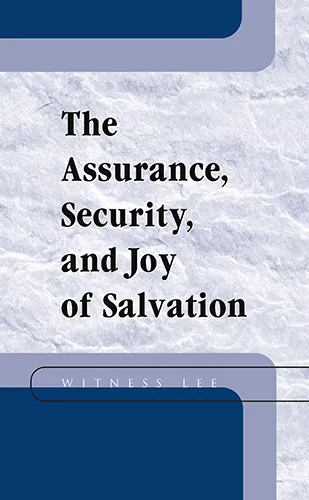 The Assurance, Security, and Joy of Salvation
The Assurance, Security, and Joy of Salvation
 The Precious Blood of Christ
The Precious Blood of Christ
 The Way to Be Freed from Anxiety
The Way to Be Freed from Anxiety
 A Life Full of Forbearance but without Anxiety
A Life Full of Forbearance but without Anxiety
 Living and Magnifying Christ versus Anxiety
Living and Magnifying Christ versus Anxiety
 Abiding in Christ
Abiding in Christ
 Always to Pray and Not Lose Heart
Always to Pray and Not Lose Heart
 The Apostle’s Concern for the Believers
The Apostle’s Concern for the Believers
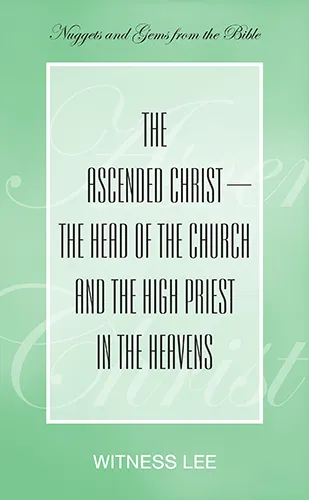 The Ascended Christ—the Head of the Church and the High Priest in the Heavens
The Ascended Christ—the Head of the Church and the High Priest in the Heavens
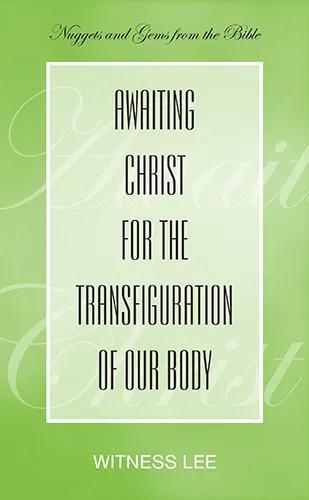 Awaiting Christ for the Transfiguration of Our Body
Awaiting Christ for the Transfiguration of Our Body
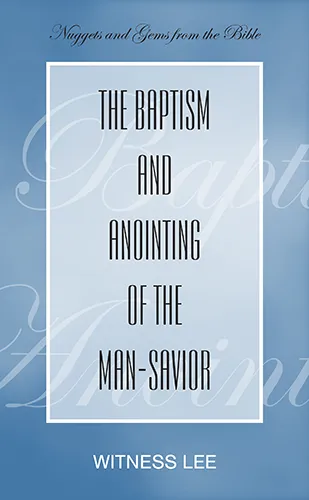 The Baptism and Anointing of the Man‑Savior
The Baptism and Anointing of the Man‑Savior
 Bearing Fruit by the Overflow of the Inner Life
Bearing Fruit by the Overflow of the Inner Life
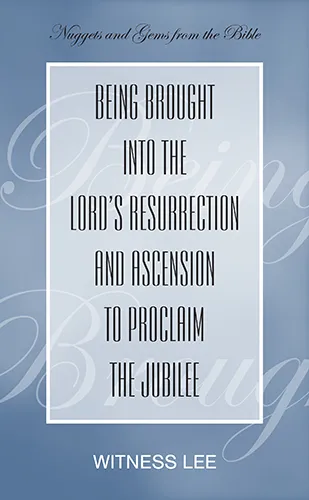 Being Brought into the Lord’s Resurrection and Ascension to Proclaim the Jubilee
Being Brought into the Lord’s Resurrection and Ascension to Proclaim the Jubilee
 Being Like-souled and Risking Our Soul
Being Like-souled and Risking Our Soul
 The Believers’ Fellowship in the Apostle’s Need
The Believers’ Fellowship in the Apostle’s Need
 The Believers’ Support to the Apostle
The Believers’ Support to the Apostle
 The Best Choice of Paul
The Best Choice of Paul
 The Bible—a Romance of a Universal Couple
The Bible—a Romance of a Universal Couple
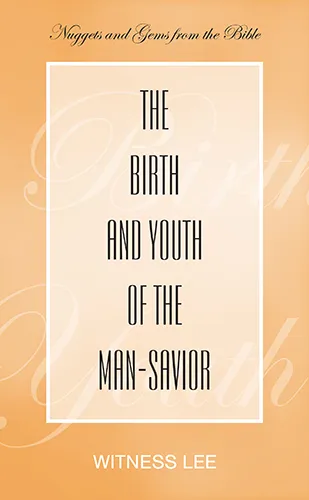 The Birth and Youth of the Man-Savior
The Birth and Youth of the Man-Savior
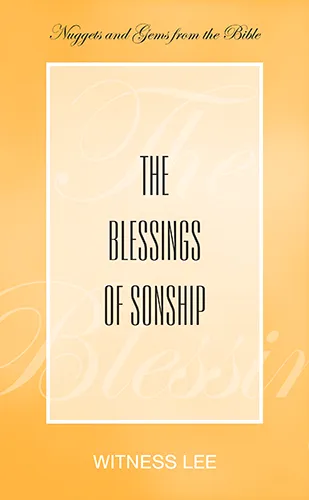 The Blessings of Sonship
The Blessings of Sonship
 Born of the Spirit in Our Spirit
Born of the Spirit in Our Spirit
 The Bountiful Supply of the Spirit of Jesus Christ
The Bountiful Supply of the Spirit of Jesus Christ
 The Branches of the Vine
The Branches of the Vine
 Calling on the Name of the Lord
Calling on the Name of the Lord
 Children of God Shining as Luminaries
Children of God Shining as Luminaries
 Christ as Our Forbearance
Christ as Our Forbearance
 Christ as the Word Bringing Forth Children of God
Christ as the Word Bringing Forth Children of God
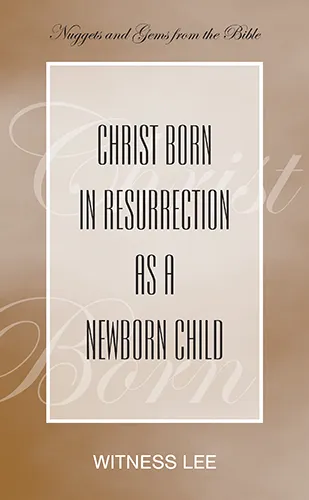 Christ Born in Resurrection as a Newborn Child
Christ Born in Resurrection as a Newborn Child
 Christ Bringing the Believers into the Father
Christ Bringing the Believers into the Father
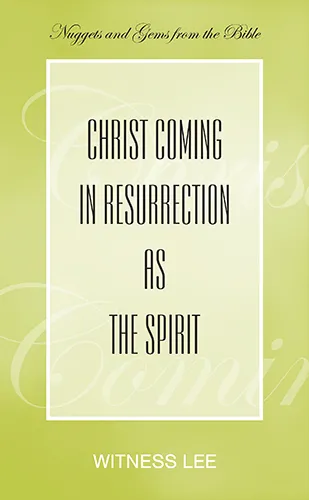 Christ Coming in Resurrection as the Spirit
Christ Coming in Resurrection as the Spirit
 Christ Making His Home in Us
Christ Making His Home in Us
 Christ, Salvation, God, and the Word of Life
Christ, Salvation, God, and the Word of Life
 The Church in Philippi—Partakers of Grace
The Church in Philippi—Partakers of Grace
 The Conception of the Man-Savior
The Conception of the Man-Savior
 Condemnation—the Need of Salvation
Condemnation—the Need of Salvation
 The Condition and Requirements for Entering into the Kingdom of God
The Condition and Requirements for Entering into the Kingdom of God
 Conformed to Christ’s Death
Conformed to Christ’s Death
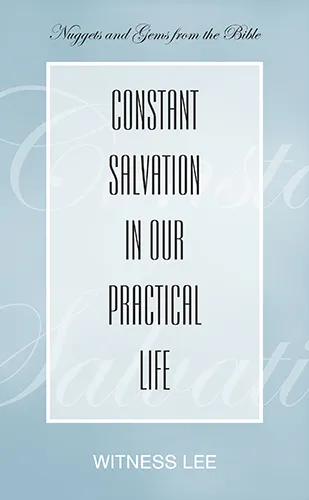 Constant Salvation in Our Practical Life
Constant Salvation in Our Practical Life
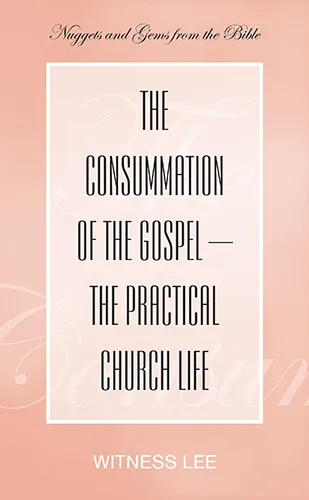 The Consummation of the Gospel—the Practical Church Life
The Consummation of the Gospel—the Practical Church Life
 Counting All Things Loss on Account of Christ
Counting All Things Loss on Account of Christ
 Deep Calls Unto Deep
Deep Calls Unto Deep
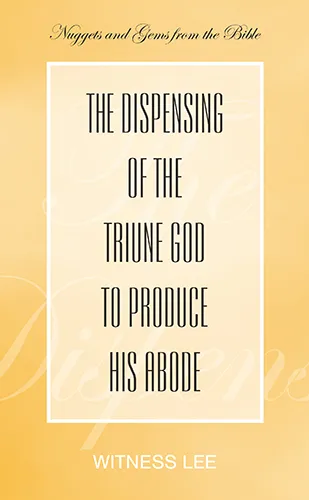 The Dispensing of the Triune God to Produce His Abode
The Dispensing of the Triune God to Produce His Abode
 The Divine and Rich Provision for Our Constant Salvation
The Divine and Rich Provision for Our Constant Salvation
 The Divine Transmission from the Ascended Christ to the Church
The Divine Transmission from the Ascended Christ to the Church
 Doing Everything in the Name of the Lord
Doing Everything in the Name of the Lord
 Enjoying the Blessings of the Jubilee
Enjoying the Blessings of the Jubilee
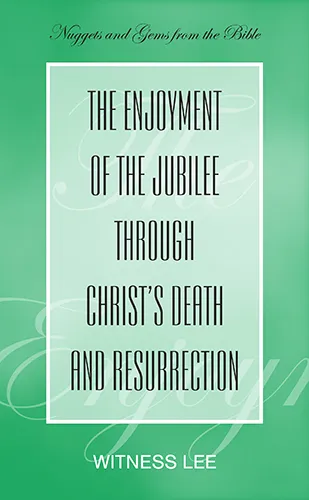 The Enjoyment of the Jubilee through Christ’s Death and Resurrection
The Enjoyment of the Jubilee through Christ’s Death and Resurrection
 Entering Jerusalem and Cleansing the Temple
Entering Jerusalem and Cleansing the Temple
 Eternity Past, Eternity Future, and the Bridge of Time
Eternity Past, Eternity Future, and the Bridge of Time
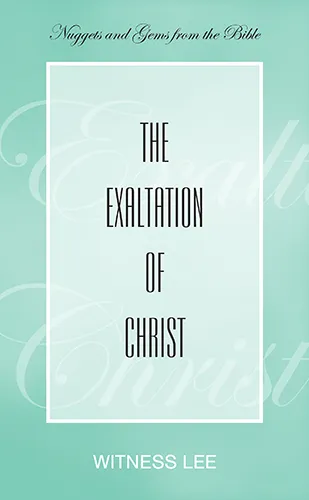 The Exaltation of Christ
The Exaltation of Christ
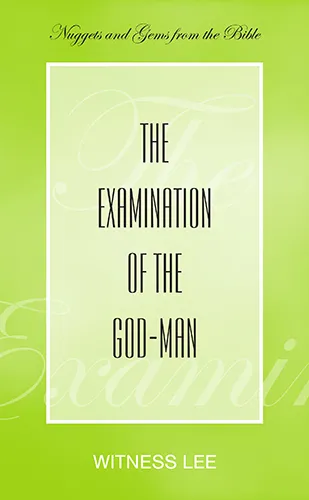 The Examination of the God-man
The Examination of the God-man
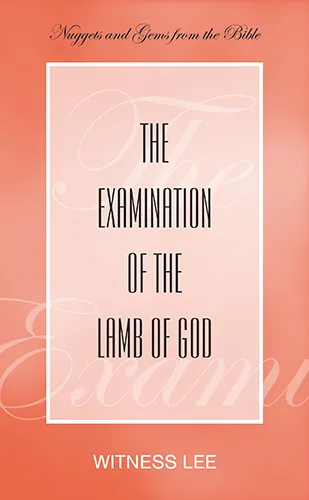 The Examination of the Lamb of God
The Examination of the Lamb of God
 The Example of Justification
The Example of Justification
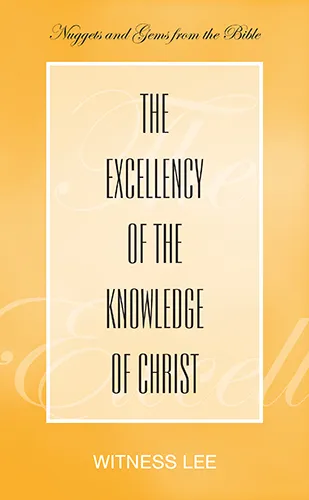 The Excellency of the Knowledge of Christ
The Excellency of the Knowledge of Christ
 The Exercise of Forbearance
The Exercise of Forbearance
 The Expression of a Life Which Lives Christ
The Expression of a Life Which Lives Christ
 The Feeding Christ and the Peace-giving Christ
The Feeding Christ and the Peace-giving Christ
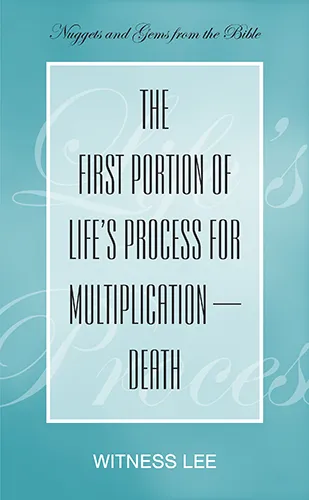 The First Portion of Life’s Process for Multiplication—Death
The First Portion of Life’s Process for Multiplication—Death
 The Freedom of the Spirit in Our Spirit
The Freedom of the Spirit in Our Spirit
 From Sinners to Sons to Form the Body of Christ
From Sinners to Sons to Form the Body of Christ
 Gaining Christ by Pursuing Him
Gaining Christ by Pursuing Him
 The Gift in Christ Surpassing the Heritage in Adam
The Gift in Christ Surpassing the Heritage in Adam
 Gifts of Grace in Life
Gifts of Grace in Life
 The Goal of God’s Heavenly Calling
The Goal of God’s Heavenly Calling
 The Goal of God’s Selection—Vessels to Express Him
The Goal of God’s Selection—Vessels to Express Him
 The Goal of the Christian Life—to Live Christ
The Goal of the Christian Life—to Live Christ
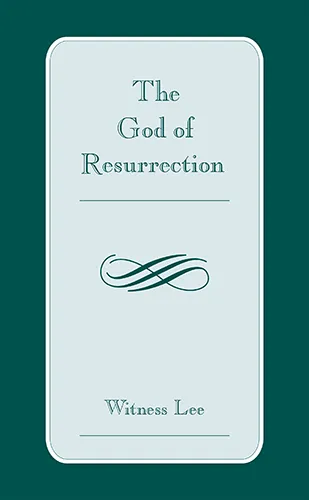 The God of Resurrection
The God of Resurrection
 A God Who Hides Himself
A God Who Hides Himself
 God’s Economy in His Selection
God’s Economy in His Selection
 God’s Intention to Have a God-man
God’s Intention to Have a God-man
 God’s Salvation and God’s Reward
God’s Salvation and God’s Reward
 God’s Selection—Our Destiny
God’s Selection—Our Destiny
 The Good Samaritan—a Figure of the Man‑Savior
The Good Samaritan—a Figure of the Man‑Savior
 The Good Slaves and the Wicked Slaves
The Good Slaves and the Wicked Slaves
 The Gospel of God
The Gospel of God
 Grace, Salvation, the Spirit, and Christ
Grace, Salvation, the Spirit, and Christ
 Heirs Conformed for Glorification
Heirs Conformed for Glorification
 Holding Forth Christ
Holding Forth Christ
 How Sinners Become the Man-Savior’s Real Relatives
How Sinners Become the Man-Savior’s Real Relatives
 How to Follow the Man‑Savior
How to Follow the Man‑Savior
 Identification with Christ
Identification with Christ
 The Immeasurable Christ
The Immeasurable Christ
 In One Spirit, with One Soul
In One Spirit, with One Soul
 The Inauguration of the Man-Savior
The Inauguration of the Man-Savior
 The Incarnation of the Forgiving God
The Incarnation of the Forgiving God
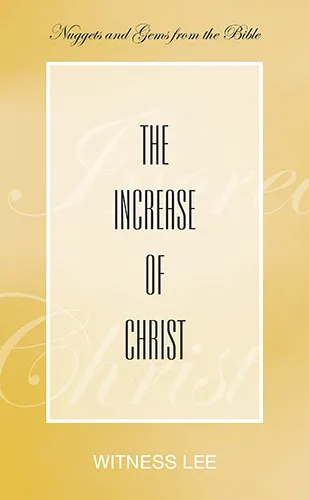 The Increase of Christ
The Increase of Christ
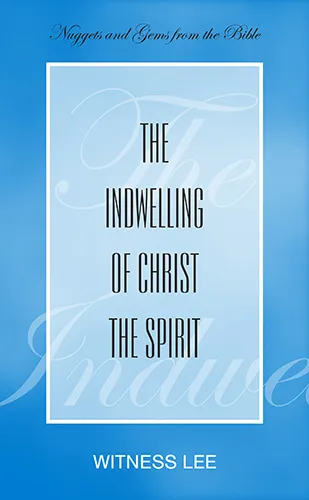 The Indwelling of Christ as the Spirit
The Indwelling of Christ as the Spirit
 The Jubilee—Its Definition
The Jubilee—Its Definition
 Justification in God’s Way
Justification in God’s Way
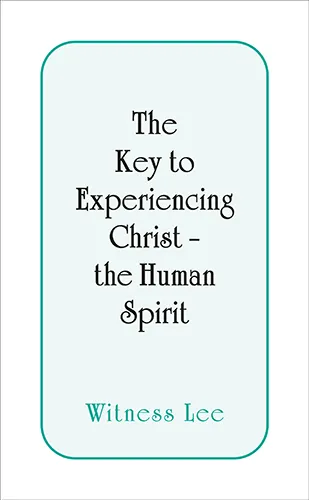 The Key to Experiencing Christ—the Human Spirit
The Key to Experiencing Christ—the Human Spirit
 The Kind of Life that Lives in the Jubilee
The Kind of Life that Lives in the Jubilee
 The Kingdom of God and the Rapture of the Overcomers
The Kingdom of God and the Rapture of the Overcomers
 The Lamb, the Dove, and the House of God
The Lamb, the Dove, and the House of God
 The Law of the Spirit of Life
The Law of the Spirit of Life
 A Life Full of Forbearance
A Life Full of Forbearance
 A Life That Lives Christ
A Life That Lives Christ
 Life’s Cry to the Thirsty Ones
Life’s Cry to the Thirsty Ones
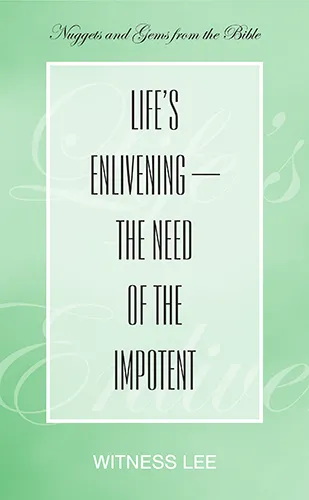 Life’s Enlivening—the Need of the Impotent
Life’s Enlivening—the Need of the Impotent
 Life’s Feeding—the Need of the Hungry
Life’s Feeding—the Need of the Hungry
 Life’s Healing—the Need of the Dying
Life’s Healing—the Need of the Dying
 Life’s Issue—the Church
Life’s Issue—the Church
 Life’s Multiplication—through Death and Resurrection
Life’s Multiplication—through Death and Resurrection
 Life’s Prayer for Oneness
Life’s Prayer for Oneness
 Life’s Prayer—for the Glorification of the Triune God
Life’s Prayer—for the Glorification of the Triune God
 Life’s Principle—to Change Death into Life
Life’s Principle—to Change Death into Life
 Life’s Purpose—to Build the House of God
Life’s Purpose—to Build the House of God
 Life’s Quenching—the Need of the Thirsty
Life’s Quenching—the Need of the Thirsty
 Life’s Regenerating—the Need of the Moral
Life’s Regenerating—the Need of the Moral
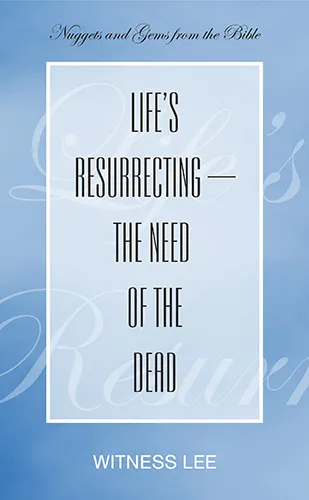 Life’s Resurrecting—the Need of the Dead
Life’s Resurrecting—the Need of the Dead
 Life’s Satisfying—the Need of the Immoral
Life’s Satisfying—the Need of the Immoral
 Life’s Setting Free—the Need of Those under the Bondage of Sin
Life’s Setting Free—the Need of Those under the Bondage of Sin
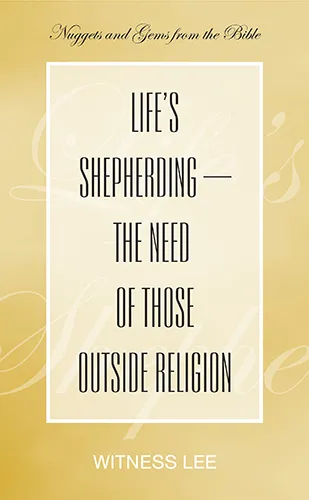 Life’s Shepherding—the Need of Those outside Religion
Life’s Shepherding—the Need of Those outside Religion
 Life’s Sight—the Need of the Blind in Religion
Life’s Sight—the Need of the Blind in Religion
 Life’s Washing in Love
Life’s Washing in Love
 Life’s Washing to Maintain Fellowship
Life’s Washing to Maintain Fellowship
 Living by the Law of Life
Living by the Law of Life
 The Lord Bringing Forth Many Brothers
The Lord Bringing Forth Many Brothers
 The Lord Jesus as the Man-Savior
The Lord Jesus as the Man-Savior
 The Lord Meeting with the Believers in Resurrection
The Lord Meeting with the Believers in Resurrection
 The Lord Moving and Living with the Believers in Resurrection
The Lord Moving and Living with the Believers in Resurrection
 The Lord Working and Walking with the Believers in Resurrection
The Lord Working and Walking with the Believers in Resurrection
 The Lord’s Longing to Be Released through Death to Produce the Kingdom
The Lord’s Longing to Be Released through Death to Produce the Kingdom
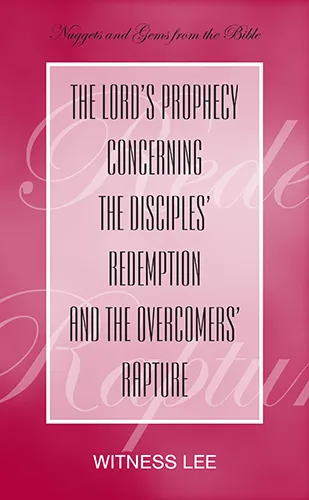 The Lord’s Prophecy concerning the Disciples’ Redemption and the Overcomers’ Rapture
The Lord’s Prophecy concerning the Disciples’ Redemption and the Overcomers’ Rapture
 The Lord’s Prophecy of Things to Come
The Lord’s Prophecy of Things to Come
 The Love of the Divine Trinity in Saving Sinners
The Love of the Divine Trinity in Saving Sinners
 Loving and Seeking the Resurrected Christ
Loving and Seeking the Resurrected Christ
 Magnifying Christ by Living Him
Magnifying Christ by Living Him
 The Man-Savior Arrested and Judged
The Man-Savior Arrested and Judged
 The Man-Savior Suffering the Judgment of God for Sinners to Accomplish the Vicarious Death for Them
The Man-Savior Suffering the Judgment of God for Sinners to Accomplish the Vicarious Death for Them
 The Man-Savior’s All‑inclusive Death
The Man-Savior’s All‑inclusive Death
 The Man‑Savior’s Ascension
The Man‑Savior’s Ascension
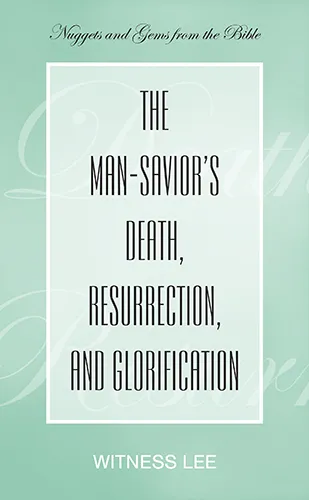 The Man‑Savior’s Death, Resurrection, and Glorification
The Man‑Savior’s Death, Resurrection, and Glorification
 The Man-Savior’s Fourfold Commission
The Man-Savior’s Fourfold Commission
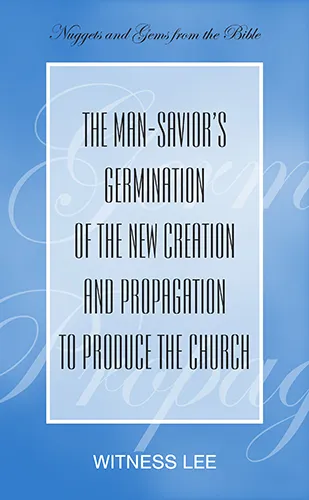 The Man‑Savior’s Germination of the New Creation and Propagation to Produce the Church
The Man‑Savior’s Germination of the New Creation and Propagation to Produce the Church
 The Man‑Savior’s God‑man Living
The Man‑Savior’s God‑man Living
 The Man‑Savior’s God‑man Living
The Man‑Savior’s God‑man Living
 The Man-Savior’s Incarnation Fulfilling the Purpose of God’s Creation of Man
The Man-Savior’s Incarnation Fulfilling the Purpose of God’s Creation of Man
 The Man‑Savior’s Living in His Believers
The Man‑Savior’s Living in His Believers
 A Mind to Pursue Christ
A Mind to Pursue Christ
 The Need of Forbearance in Married Life and Family Life
The Need of Forbearance in Married Life and Family Life
 A Normal Living for the Church Life
A Normal Living for the Church Life
 Not Being Stumbled in the Lord to Receive His Blessing
Not Being Stumbled in the Lord to Receive His Blessing
 On Our Journey with the Lord
On Our Journey with the Lord
 Oneness in the Divine Glory
Oneness in the Divine Glory
 Oneness in the Father’s Name
Oneness in the Father’s Name
 Oneness in the Triune God
Oneness in the Triune God
 The Organism of the Triune God in the Divine Dispensation
The Organism of the Triune God in the Divine Dispensation
 Our Names Being Inscribed in the Heavens
Our Names Being Inscribed in the Heavens
 Our Need of the Lord’s Healing
Our Need of the Lord’s Healing
 The Passover Replaced by the Lord’s Supper
The Passover Replaced by the Lord’s Supper
 Paul’s Greetings and His Blessing
Paul’s Greetings and His Blessing
 Paul’s Secret of Sufficiency in Christ
Paul’s Secret of Sufficiency in Christ
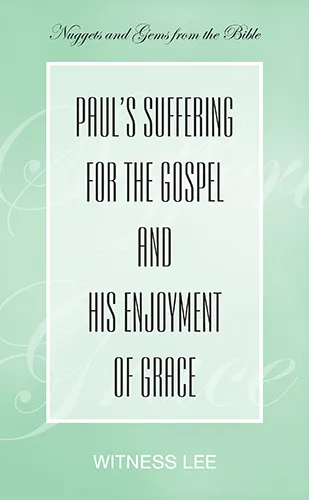 Paul’s Suffering for the Gospel and His Enjoyment of Grace
Paul’s Suffering for the Gospel and His Enjoyment of Grace
 A Portrait of the Man‑Savior
A Portrait of the Man‑Savior
 Praising
Praising
 Pray-reading the Word
Pray-reading the Word
 Praying Ourselves into God
Praying Ourselves into God
 Principles of the Character of God’s Children
Principles of the Character of God’s Children
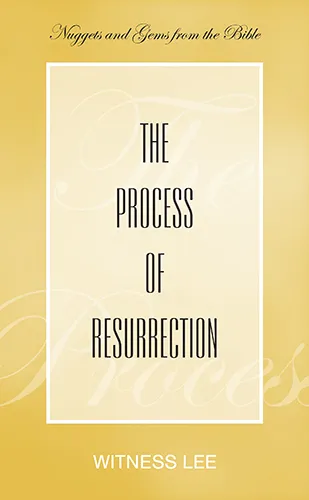 The Process of Resurrection
The Process of Resurrection
 Proclaiming the Acceptable Year of the Lord
Proclaiming the Acceptable Year of the Lord
 The Progressive Revelation of God
The Progressive Revelation of God
 Pursue toward the Goal for the Prize of the High Calling
Pursue toward the Goal for the Prize of the High Calling
 The Qualification and the Basic Factor for the Man‑Savior’s Dynamic Salvation
The Qualification and the Basic Factor for the Man‑Savior’s Dynamic Salvation
 Receive One Another in Love
Receive One Another in Love
 Receiving the Believers for the Church Life
Receiving the Believers for the Church Life
 Receiving the Word through the Spirit
Receiving the Word through the Spirit
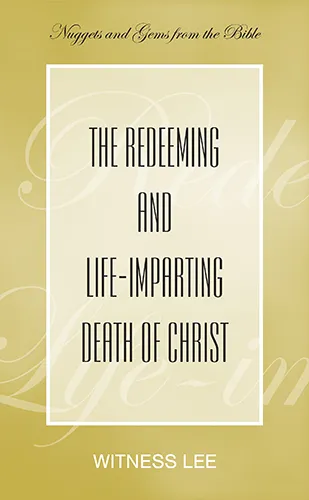 The Redeeming and Life-imparting Death of Christ
The Redeeming and Life-imparting Death of Christ
 The Religion of Law versus the Great I Am
The Religion of Law versus the Great I Am
 Remembering the Man‑Savior
Remembering the Man‑Savior
 The Result of Justification—the Full Enjoyment of God in Christ
The Result of Justification—the Full Enjoyment of God in Christ
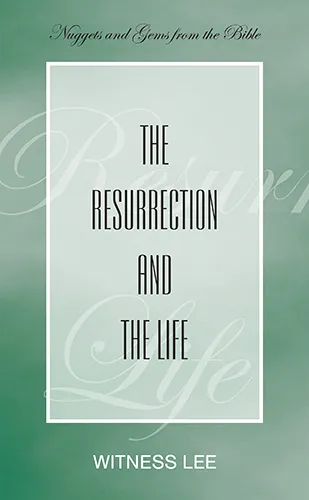 The Resurrection and the Life
The Resurrection and the Life
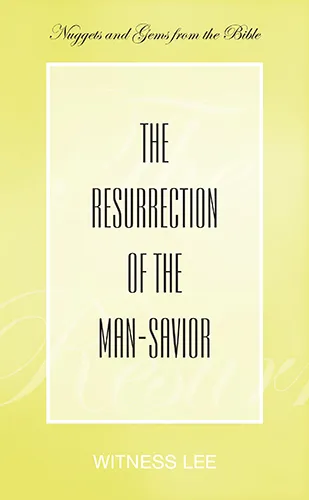 The Resurrection of the Man‑Savior
The Resurrection of the Man‑Savior
 A Revelation of Life and Building
A Revelation of Life and Building
 The Rich Word for Living Christ
The Rich Word for Living Christ
 The Riches, the Supply, and the Word
The Riches, the Supply, and the Word
 Righteousness—the Power of the Gospel
Righteousness—the Power of the Gospel
 The Sacrifice of Your Faith
The Sacrifice of Your Faith
 A Salvation in the Highest Standard of Morality
A Salvation in the Highest Standard of Morality
 The Salvation of Zaccheus
The Salvation of Zaccheus
 Sanctification in Life
Sanctification in Life
 Satisfying God and Making Him Happy
Satisfying God and Making Him Happy
 Saturated with the Word to Live Christ
Saturated with the Word to Live Christ
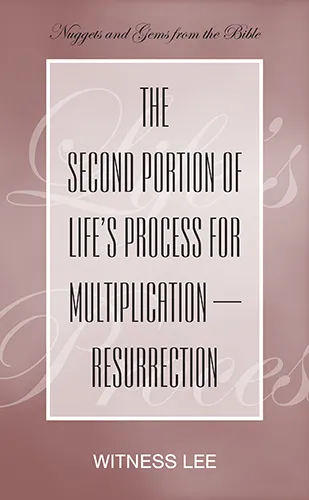 The Second Portion of Life’s Process for Multiplication—Resurrection
The Second Portion of Life’s Process for Multiplication—Resurrection
 Seeking to Know Christ
Seeking to Know Christ
 Serving the Lord according to His Desire and Preference
Serving the Lord according to His Desire and Preference
 Serving the Lord as Prudent Stewards
Serving the Lord as Prudent Stewards
 A Simple Way to Touch the Lord
A Simple Way to Touch the Lord
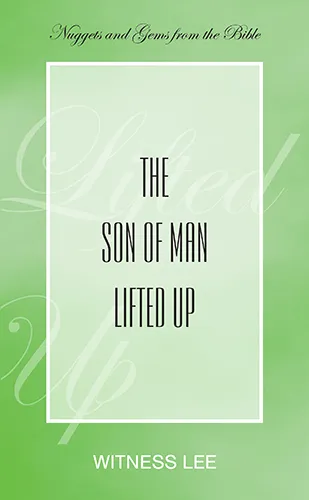 The Son of Man Lifted Up
The Son of Man Lifted Up
 Sons of the Most High
Sons of the Most High
 The Spirit and the Word
The Spirit and the Word
 The Spirit of Jesus Christ
The Spirit of Jesus Christ
 The Spiritual Condition of Every Fallen Human Being
The Spiritual Condition of Every Fallen Human Being
 The Spreading of the Ministry of Jubilee
The Spreading of the Ministry of Jubilee
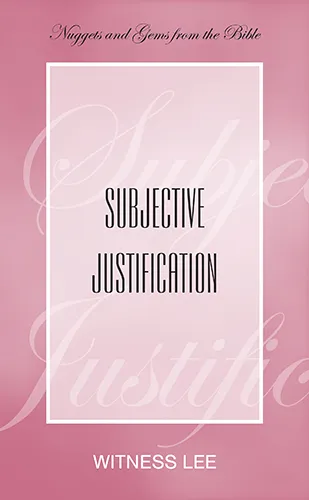 Subjective Justification
Subjective Justification
 The Supply of the Spirit and the Operation of God
The Supply of the Spirit and the Operation of God
 The Supply of the Spirit in the Word
The Supply of the Spirit in the Word
 Taking Christ as Our Pattern
Taking Christ as Our Pattern
 Tell Him
Tell Him
 The Test of the Man‑Savior
The Test of the Man‑Savior
 Thinking the Same Thing and Rejoicing in the Lord
Thinking the Same Thing and Rejoicing in the Lord
 A Thirsty Savior and a Thirsty Sinner
A Thirsty Savior and a Thirsty Sinner
 The Three Laws in Romans Seven
The Three Laws in Romans Seven
 Three Positive Aspects of the Spiritual Believers
Three Positive Aspects of the Spiritual Believers
 The Three Stages of Spiritual Matters in the Writings of John
The Three Stages of Spiritual Matters in the Writings of John
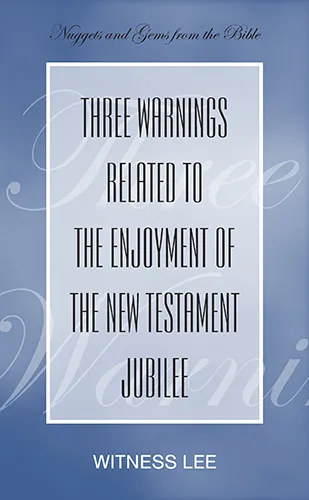 Three Warnings Related to the Enjoyment of the New Testament Jubilee
Three Warnings Related to the Enjoyment of the New Testament Jubilee
 A Time with the Lord
A Time with the Lord
 To Be Found in Christ
To Be Found in Christ
 To Be Found in Christ in the Righteousness of God
To Be Found in Christ in the Righteousness of God
 To Live Christ by the Spirit
To Live Christ by the Spirit
 To Obtain Christ by Experiencing the Power of His Resurrection
To Obtain Christ by Experiencing the Power of His Resurrection
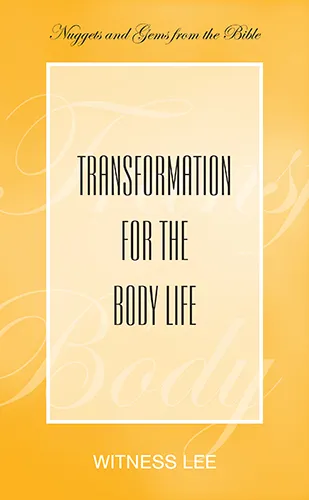 Transformation for the Body Life
Transformation for the Body Life
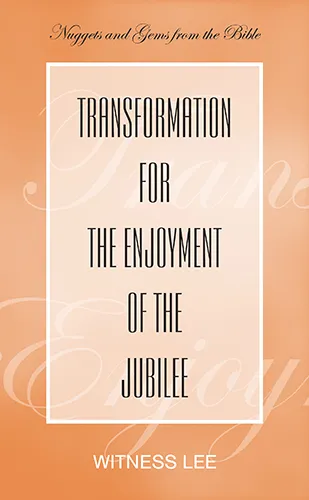 Transformation for the Enjoyment of the Jubilee
Transformation for the Enjoyment of the Jubilee
 The Triune God Dispensing Himself into the Believers
The Triune God Dispensing Himself into the Believers
 The Two Husbands in Romans Seven
The Two Husbands in Romans Seven
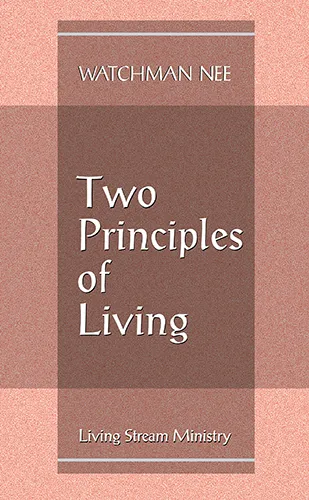 Two Principles of Living
Two Principles of Living
 The Unique Mind and the Unique Walk
The Unique Mind and the Unique Walk
 A Universal Battle—Life versus Death
A Universal Battle—Life versus Death
 A Warning to the Rich and Self-justified
A Warning to the Rich and Self-justified
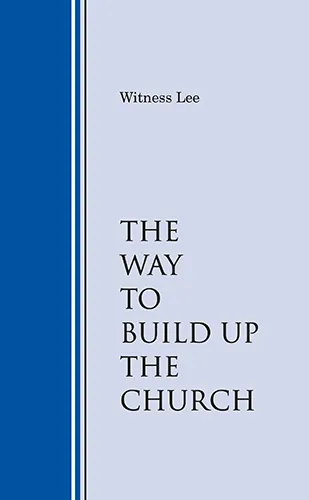 The Way to Build Up the Church
The Way to Build Up the Church
 The Word Incarnated for Our Enjoyment
The Word Incarnated for Our Enjoyment
 The Word of Life
The Word of Life
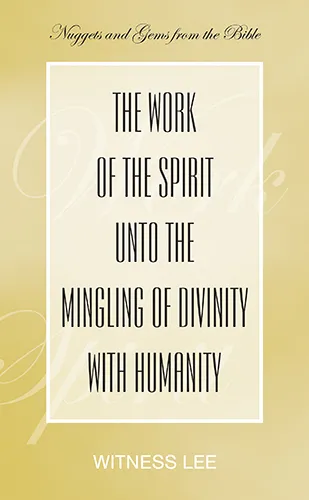 The Work of the Spirit unto the Mingling of Divinity with Humanity
The Work of the Spirit unto the Mingling of Divinity with Humanity
 Working Out Our Salvation
Working Out Our Salvation



































































































































































































































